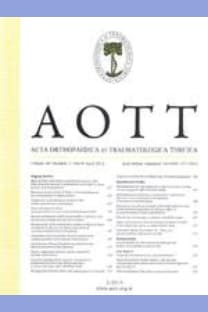Dizin posteromedial kapsülü yırtık ve sağlamken ligamentum collaterale mediale'nin biyomekaniğinin deneysel incelenmesi
-
Experimental evaluation of the biomechanics of ligamentum collaterale mediale in intact and ruptured posteromedial capsule of the knee joint
-,
- ISSN: 1017-995X
- Başlangıç: 2015
- Yayıncı: Türk Ortopedi ve Travmatoloji Derneği
Ön çapraz bağ tamirinde kemik bloklu iliotibial bantın intraartiküler transferi
Mehmet BİNNET, Ertan MERGEN, Yalim ATES, Yavuz ONEM
Ayak parmaklarındaki deformasyonun cerrahi tedavisi
Siklosporin-A ile immünosupresyonun yağ embolisine etkisi
Osman GUVEN, Tanil ESMENLİ, Sevgi KULLU
Perthes-Calve-Legg hastalığında cheilectomy ameliyatının yeri
Omer TASER, Mehmet ASİK, Hilmi AYDINOK, Mehmet CAKMAK, İrfan ESENKAYA
Kobaylarda intraartiküler serbest periost otogreftlerinin kondrojenik potansiyeli
Tanil ESMENLİ, Osman GUVEN, Sevgi KULLU
Celal BAKİ, Ahmet TURHAN, Aydin BİYİKLİOGLU, Cetin ONDER
Humerus cisim kırıklarının kapalı transepikondiler intrameduller osteosentezi
Emin ALİCİ, Serdar PEDUKCOSKUN, Nuri EREL
Dizin rekonstrüktif bağ tamirlerinde artroskopinin yeri
Mahmut DORAL, Selcuk BOLUKBASİ, Feza KORKUSUZ
Posttravmatik sempatik distrofiler: 24 vakalık klinik araştırma
Mehmet BEDİRHAN, Mustafa PAC, Ali ESBAH
Juvenil ve adolesan çağda konjenital kalça çıkıklarının tedavisi
